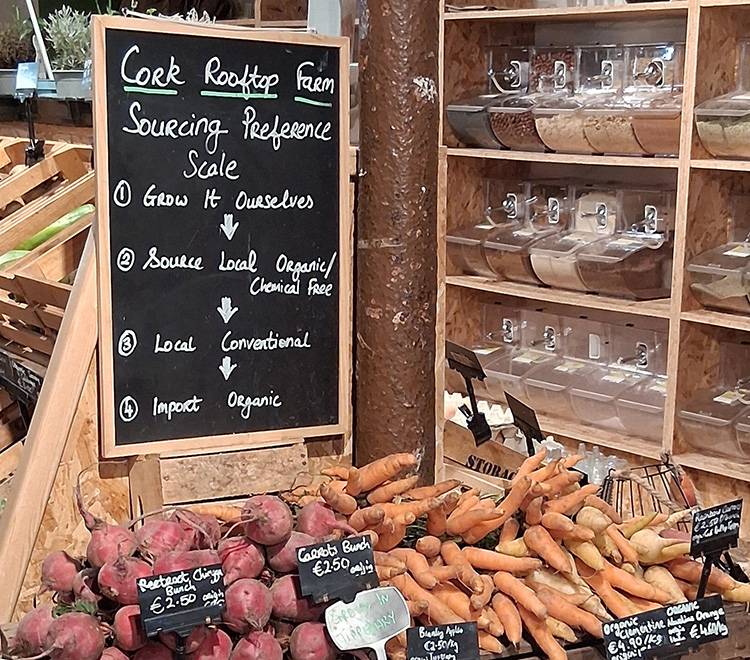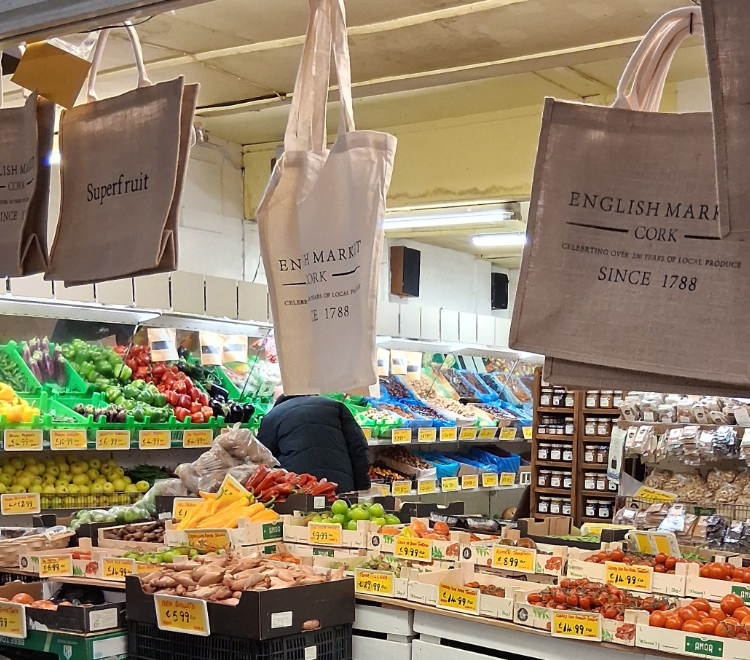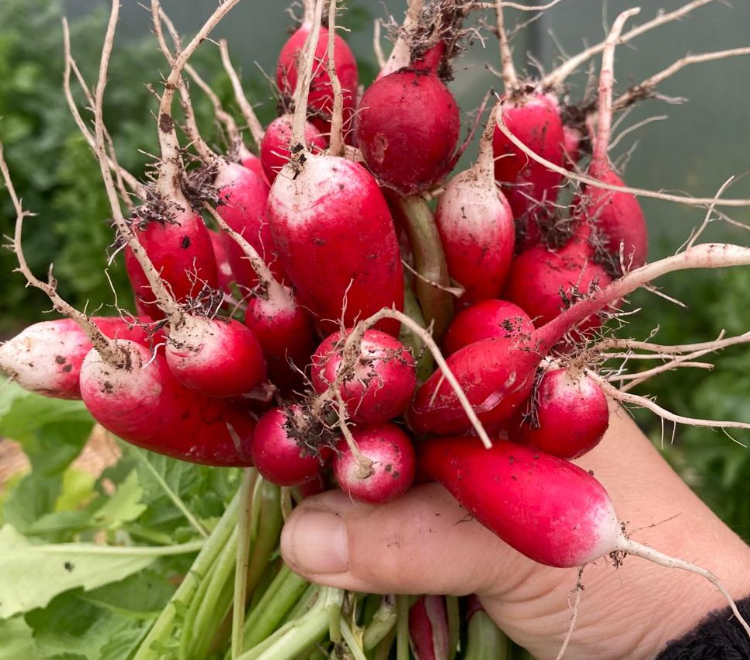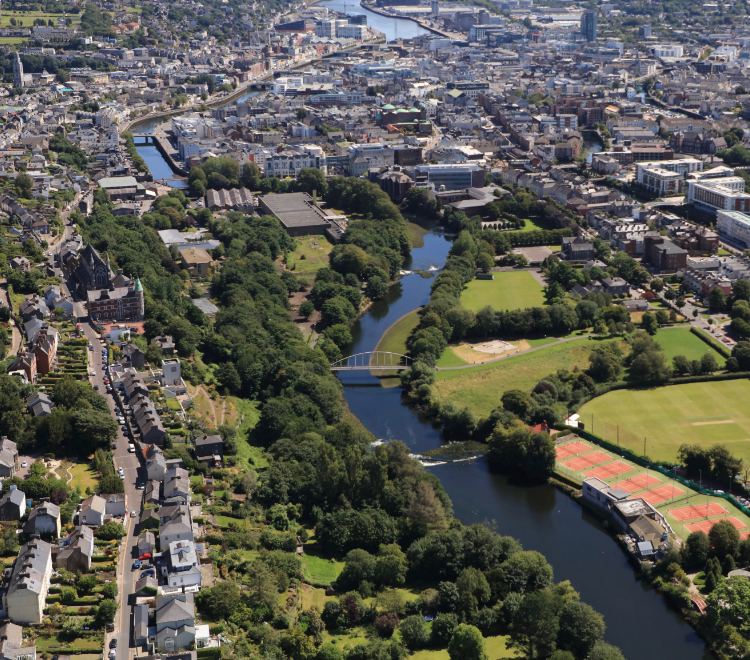The Cork Food Policy Council (CFPC) was formed ten years ago in Cork City to work towards the achievement of a fairer, healthier, more secure and sustainable food system within the City and throughout the region. There is a strong history of collaboration and cross sectoral working in the CFPC demonstrated in its support to the delivery of community-based initiatives such as community gardens, Cork sustainable food awards, and research & mapping of the food system in Cork City and surrounds.
As a Living Lab Cork City is co-creating and implementing a Sustainable and Healthy Food Strategy for the city.
Through cooperation with students and the use of a pilot Place Standard Tool adapted to the food environment, we are engaging our most vulnerable communities and our youth in a co-design process.
Through setting up of an innovative hybrid City Food Hub, including a Test Site Incubator for skilled aspiring food growers and partnerships to secure land for future developments,our Living Lab aligns to, and progresses several, of the actions from current Cork City policy and plans. This includes Cork City Climate Action Plan, Cork Healthy Cities Action Plan, and Cork city Local & Economic Community Plan.

Who we would like to support
Freshly trained horticulture students often emigrate to find opportunities elsewhere. Among our low-income community, financial means or mental health can challenge the ability to start a professional activity. Our migran communities face challenges adding to their burden, while access to fresh food and the ability to cook it is often denied by the direct provisioning services policy in place in Ireland. There are a number of sustainable small farmers struggling to keep their operations profitable because they lack the opportunity to acquire new land to expand.
Cork’s specificity is the extensive collection of fields of good agricultural land within the City. These tend to be used for big commercial and dairy farming operations or transferred to the housing sector. Aspiring horticulturalists can hardly access any of this land.
Among our vulnerable groups we have people seeking opportunities to learn, train and earn an income by starting their own growing project, expanding one or joining an existing profitable market garden.
Cork Food Policy Council acts as the missing link between land available and aspiring growers, building upon a strong tradition of community and voluntary sector partnership and activity which, through history, has empowered the local community.
What’s coming next
Phase 1
- Round of consultation workshops with various stakeholders and communities to co-design a Sustainable and Healthy Food Policy for Cork City
- Round of consultation workshops with our vulnerable groups among the food growers communities to co-design the future City Food Hub
- Launch of a Test Site Incubator on an acre of agricultural land with our first team of trained growers to start a market garden
- Evaluation of the needs of the city’s hospitals demanding fresh local produce for their kitchens
Phase 2
- Final Draft of a Sustainable and Healthy Food Policy for Cork City vision paper
- Citizen’s Jury and finalisation of a Sustainable and Healthy Food Policy for Cork City
- Round of consultation with our vulnerable groups and partner businesses to establish the terms of their cooperation and a structure for the City Food Hub
- Securing more land while working with various departments within Cork City Council to expand the activities of the first team of growers from the Test Site Incubator
- Working towards matching the needs of the city’s hospitals demanding fresh local produce for their kitchens
Local Food Challenge
Cork is not immune to the current global context of food shortages, increased food insecurity, rising food prices, the climate emergency, and rising public health anxieties associated with food consumption practices. Climate change is impacting our native as well as the global agriculture and growing sectors. Without the financial supports available to livestock and dairy counterparts, growers in Ireland are suppressed by competitive and commercial relationships with large retailers. Local horticultural growers and communities are also finding it difficult to access land to grow food. Ireland’s responsibility and commitment to reducing Greenhouse Gas Emissions by 20% by 2020 and 30% by 2030 is supported locally by Cork City Council’s commitment to carbon neutrality by 2030.
Ireland is the second most obese country in Europe (26% of the population, way above the EU average of 16%, and second only to Malta at 28%). Conversely, increasing numbers of families across Cork are finding it difficult to put nourishing food on the table due to many factors including cost, food skills, marketing of unhealthy foods and availability of fresh foods in the area. This increases the risk of people suffering ill health and exacerbates health inequalities. According to the Central Statistics Office Consumer Price Index, 57% of average household expenditure was on food and non-alcoholic beverage in 1922, compared to 11.4% in 2022.
Living Lab Activities
Policy without action is nothing. Our action is two-fold.
Cork Food Policy Council launched a public consultation on a draft Sustainable and Healthy Food Policy vision paper in August 2024. Various stakeholders and communities get a chance to discuss and co-design the draft policy through a series of workshops happening across the city until mid-2025. The heart of the process is the use of a Play Standard tool adapted to the Public Health and in Cork specifically to food and nutrition. It is a very practical and efficient way to engage communities and keep the discussions focused on the task.
The policy is being implemented through the organisation of a Food Hub for the city. The idea originated in the expansion plans of a successful small urban farm. We are running a series of workshops with small farmers, aspiring farmers and community gardeners trained in horticulture to co-design a structure that will work for everybody, consumers and growers alike. Our main action is to join the dots between agricultural land owners, aspiring growers in need of land and our most vulnerable communities who need to have access to better food to switch to a healthier diet.
Get to know the region
Cork City is Ireland's second-largest and fastest-growing city with a population of 210,000. Built on a series of islands this ancient merchant city is steeped in maritime history and a rich artistic culture. Cork's ancient motto "A safe harbour for ships" reflects the maritime haven that Cork grew from as a tiny 7th century settlement into the compact and vibrant city it is today.
Cork contributes 19% of Ireland's GDP and has the 4th highest disposable income per capita in Ireland. There are more than 36,000 students enrolled in Cork City's third level colleges.
Cork is a WHO Healthy City, an UNESCO Learning City, a Smart City and an Age Friendly City. Cork is often considered Ireland’s ‘Food Capital’ with award winning restaurants and the English Market selling locally produced foods, including fresh fish, meats, fruit and vegetables, eggs and artisan cheeses and breads and has a Cork Food Policy Council.
The economic confidence of Cork has been influenced by our trading history as a city with an export driven food economy – we had the largest butter market in the world in the 19th Century and specialised in the production and exportation of cured beef all over the world. While Cork has long regarded itself as ‘the food capital of Ireland’, this claim has rather overshadowed the extent of food poverty and malconsumption across the city
Frequently asked questions
- What is the history of the Living Lab?
The Cork Food Policy Council (CFPC) was formed ten years ago in Cork City to work towards the achievement of a fairer, healthier, more secure and sustainable food system within the City and throughout the region. Cork City’s confidence in being able to deliver and add to FEAST as a living Lab is based on the strong history of collaboration and cross sectoral working in the CFPC this is demonstrated by CFPC in its support to the delivery of community-based initiatives such as community gardens, Cork sustainable food awards, and research & mapping of the food system in Cork City and surrounds.
As part of the FEAST Living Lab call Cork Food Policy Council and Cork City Council is co-creating and implementing a sustainable and healthy food strategy for the city. This allows us to identify gaps and areas where there is a lack of access to and support to attain healthy and sustainable food in the city.
The work undertaken by Cork City as a Living Lab in FEAST aligns to, and progresses several, of the actions from current Cork City policy documents and plans. This includes Cork City Climate Action Plan, Cork Healthy Cities Action Plan, and Cork city Local & Economic Community Plan.
Cork City Council has a vital leadership role to play in the development of adaptation and mitigation measures to ensure a sustainable food system for Cork City. It is envisaged that the opportunity presented to be a Living Lab in FEAST will accelerate the development of the food strategy for Cork City and that this strategy will support innovative solutions to food poverty, experienced in disadvantaged areas of the city, work toward securing food sovereignty for the city, and grow the prospects of increasing food related jobs while enhancing sustainable food opportunities for farmers in Cork City.- Who are the stakeholders?
Cork Food Policy Council
UCC
City Council
HSE
Healthy Cities
Cork Rooftop Farm
Sláintecare Healthy Communities- What activities are conducted in the Living Lab?
The bulk of the work is centred around the future launch of a Sustainable & Healthy Food Policy for Cork. A Cork Food Policy Council Draft Vision for a Food Strategy for Cork 2025-2030 is currently submitted to various community groups for consultation and input through workshops.
In parallel the implementation of the strategy has started with the preparatory work to the build up of a Food Hub and a round of consultation workshops with small farmers in need of land to expand their commercial operation or start a new project.- What research has been conducted?
Dr Janas Harrington launched the result of her teams groundbreaking work on the Business Impact Assessment on Obesity and Population Nutrition and Sustainability in Ireland on the 11th of December 2024. This is a milestone in the design of a Sustainable & Healthy Food Policy for Cork. It will inform the set up of our innovative Food Hub to provide healthy food and healthier diet options to Corkonians, particularly those affected by food poverty, as many among our community cannot afford healthy food options and find it difficult to change their eating habits.
- What are the Living Lab facilities?
The day-to-day work of the Living Lab is undertaken by the Cork Food Policy Council with the support of Cork City Council. One FEAST coordinator is based in the City Council, which also provides meeting rooms when necessary, either in the Council buildings or in the resource centre where one of our most vibrant community gardeners are based.
We have a partnership with a few businesses committed to or supportive of sustainable and healthy food and practices who can step in to sponsor public events.- Lessons learned
Two valuable lessons learnt on our journey into setting up a City Food Hub so far.
On the one hand it is important to give freedom and space to each community groups to develop their own project while expressing their own creativity. This is the only way to reach a point where many different projects exist, within which individuals can each express their talents, skills and find joy and pride in their achievements. While ensuring the strength and resilience of each project, the broader project, in this case the Food Hub, benefits from every person being involved feeling they own it equally, and feel committed to it. The freedom and space for each community to create, react to challenges and adapt, ensures their own resilience and that of the broader project. As we are dealing with vulnerable groups, there is great personal benefits to be gained, either in skills or personal health, and this reflects on the well being of the entire group and eventually the broader community.
On the other hand, coordination is just as important. Without imposing an overarching structure where decisions are made, it is a strong and vital asset for each project to be facilitated under the guidance of an experienced coordinator, while one overall coordinator can join the dots between each project, overseeing actions on the ground, and keep the conversation open so challenges and opportunities arising are identified and addressed. The project coordinators must be knowledgeable, experienced, skilled in the topics covered by the projects, so in this case growing food, gardens and market gardens, and other useful skills such as carpentry or animal husbandry. They must be directly involved in the day-to-day operations. It is very important for any growing project coordinator to be a member of the team, give some of their time and work the land just as much as anybody else involved.
As we see it, for the long term success and resilience of the project, less is more, small is beautiful and freedom is key, while the friendly guidance of coordinators is essential to ensure the social cohesion of the groups.
In a nutshell ours is a permaculture approach. It keeps our minds open and allows us to welcome diversity and change. Every challenge is an opportunity to learn, broaden our scope and develop our strategy. We apply those ethics and principles broadly to our gardens, our community groups, inter-agency relations, and to the future economic model of the Food Hub.
Denise Cahill
Healthy Cities Co-ordinator, Cork City
- The Echo, Cork's Food Policy Council helping communities to grow their own food, EN
- The Echo, Call for public food strategy input, EN
- The Echo, We need national food strategy - and Cork is leading the way, EN
- Business Cork, Food Capital of Ireland unveils ambitious plans to feed Cork, EN
- Hospitality Ireland, Cork To Focus On Sustainable Local Food System, EN
- Stir The Jam, Food Capital of Ireland unveils ambitious plans to feed Cork, EN
- Irish Examiner (It also highlights the public consultation on the Cork Food Policy Councils 'Food strategy for Cork'), The Menu: Wouldn't it be wonderful to buy fresh fruit and veg grown by your neighbour?, EN
Testimonials from our community
The Cork City Local Economic and Community Plan 2024-2029 is a six-year plan that will guide local community and economic development of Cork City up to 2030. The aim of the LECP is to improve the quality of life for all those who live, work, study in, or visit Cork City. The LECP’s actions have a special focus on communities experiencing exclusion and disadvantage across the city. The Sustainable and Healthy Food Policy for Cork will compliment these ambitions and we are delighted to see this progress as a Living Lab in FEAST.
We need to make our staple diet become a stable diet. Food is an important part of who we are. There has been a disconnect between the various elements of the actual food chain itself: the people who are growing the food, how the choices are made and what foods get grown, the people who are part of the subsequent chain and take the raw material to package it, so it can be bought, sold and distributed to the people who prepare the food.
There is an army of people involved in each item of food that we eat. If we believe in a truly democratic society we must involve ourselves, and make sure that we own that process in a way that our awareness and our confidence in it is as high as it can be. This is what we are attempting with the launch of a Sustainable & Healthy Food Policy for Cork.
…even as the most introverted introvert, the social aspect has been the most enjoyable. The drop-in hours allow for you to decide how much you are willing to give and you can meet kind, interesting people who can teach you a lot not only about gardening but also about life.




